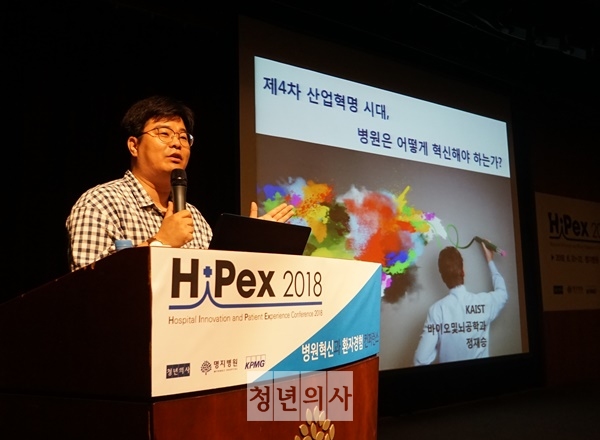The Fourth Industrial Revolution, the digital revolution with a fusion of technologies, will stimulate hospitals to change their healthcare systems to patient-centric ones, an expert said Wednesday.
Jeong Jae-seung, a professor of bio and brain engineering at Korea Advanced Institute of Science and Technology (KAIST), made the point during his lecture titled “What physicians should do to prepare for the Fourth Industrial Revolution.”

“In essence, the Fourth Industrial Revolution will be a system that monitors what people want, makes data based on experience, and provides customized service based on such information,” Jeong said. He noted that people might think such world will put too much focus on technologies, but in fact, it will concentrate more on humans.
Jeong’s lecture was part of an academic conference at Myongji Hospital in Ilsan, Gyeonggi Province. The Korean Doctors’ Weekly, Korea Biomedical
Review’s sister paper, and Samjong KPMG co-hosted the conference, under the title of “Hospital Innovation and Patient Experience Conference 2018 (HiPex 2018).”
“People might think hospital jobs could vanish due to advanced systems in the era of the Fourth Industrial Revolution, but that is not true,” Jeong said. “If the systems change to a customer- and patient-centered ones, medical workers will be able to use these data to offer better healthcare.”
Jeong went on to say that in the Fourth Industrial Revolution era, occupations will change rather than disappear.
“The life spans of the technologies have become shortened, and the biological life span of human life is getting longer. We’re heading towards an era where people cannot live life only with what they learned in college,” the professor said.
Jeong advised people turn away from worrying that if they could continue working until retirement without learning anything new but apply new systems and use them. “It is important to get rid of fear,” he said.
Jeong took an example of Harvard Medical School to explain how quickly the school adapted its curriculum to meet the needs of the Fourth Industrial Revolution era. “The school teaches patient experience from the undergraduate stage. It has become less important to put medical knowledge elaborately into the heads. Instead, it has become more significant to learn how to treat patients,” he said.
Jeong said Harvard’s medical curriculum includes engineering education and the handling of equipment, adding that the entire U.S. university education was changing.
“Patient experience is important. We have to think hard in advance how to make our healthcare systems to help patients receive better service at hospitals and be discharged,” he emphasized.

